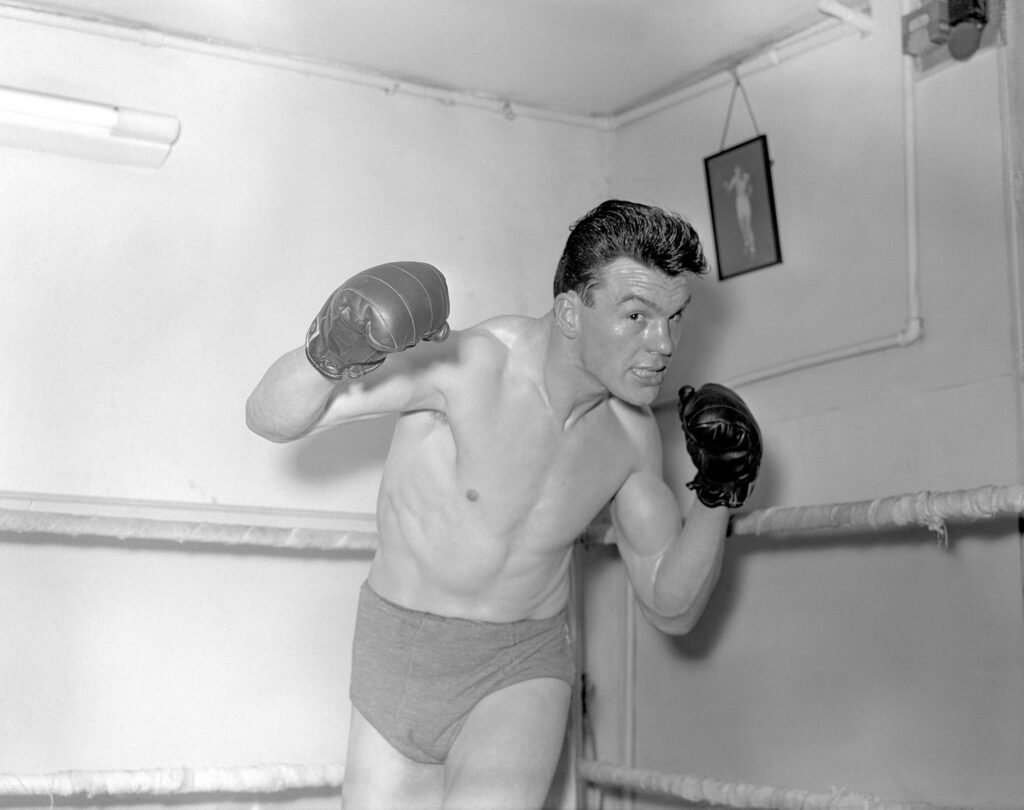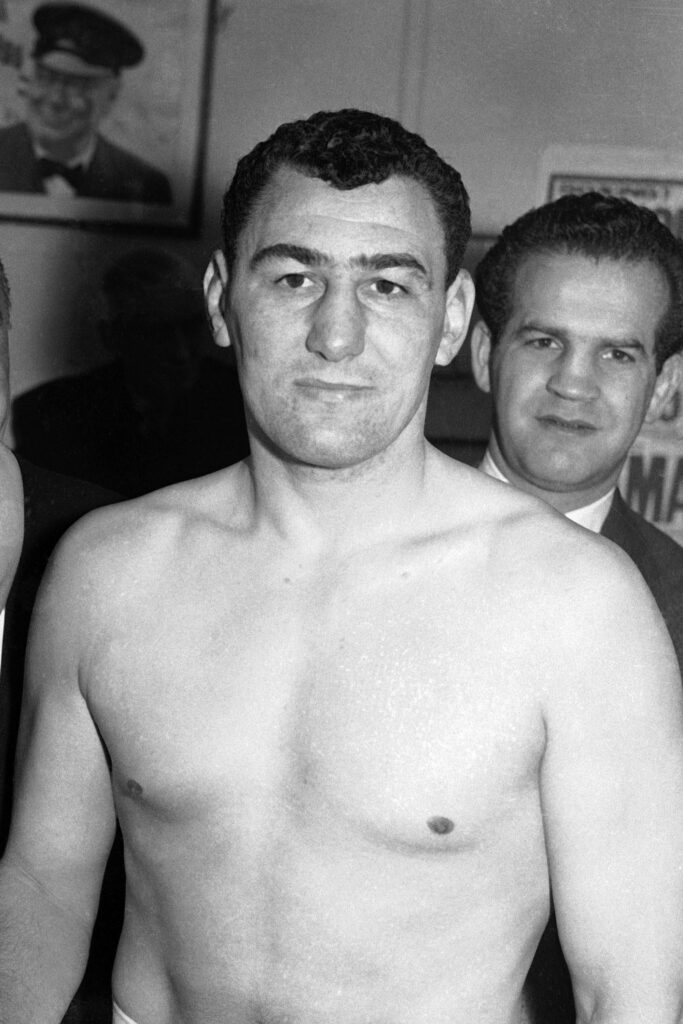With British boxing enjoying worldwide supremacy in the heavyweight division with both champions as well as a number of leading contenders and prospects, IBHOF inductee Graham Houston looks back at the forgotten golden era of British heavies where Henry Cooper, Joe Erskine, Brian London and Dick Richardson battled for contention.
Daniel Dubois and Joe Joyce have tune-up fights scheduled, hopefully leading to their Covid-delayed fight getting rescheduled before the end of the year. Dillian Whyte meets Alexander Povetkin on the Matchroom grounds on August 22. Activity is slowly starting to heat up in the heavyweight division.
Tyson Fury and Anthony Joshua are the world’s top two heavyweights and it is hoped they will fulfil mandatory-defence requirements before the end of the year. Dereck Chisora is in the mix for big fights. Hughie Fury has lost only at world-class level and he actually looked more like a two-fisted heavyweight instead of strictly a jab-and-move boxer in his last fight.
So, the British heavyweight scene is stronger than it has ever been. Yes, Lennox Lewis was dominant and Frank Bruno won a world title in the 1990s, and Lewis fought Bruno in one of British boxing’s biggest heavyweight fights, but what we have now is strength in depth.
This reminds me of the British heavyweight division’s strength in depth in the late 1950s and into the 1960s. Three British heavyweights were in the WBA world top-10 rankings: Henry Cooper, Joe Erskine and Brian London. Then there was Dick Richardson of Wales, who was European heavyweight champion. Cooper, Erskine, London and Richardson had a round robin of fights against each other.
At this time, boxing got prime coverage in the British newspapers. A British title fight would be the back-page lead story in the national newspapers. Because I go back such a long way I was on-site for some of the big fights involving Britain’s ‘Big Four’ heavyweights of the era, not as a writer (that came later) but as a young fight fan.
Cooper got his world rating by virtue of a 10-round points win over the highly ranked US contender Zora Folley. That fight was at Wembley Pool (as it was then known) on October 14, 1958. Folley was brought in as a replacement for Alex Miteff, of Argentina, who had suffered a knee injury.
The promoter, Harry Levene, proudly informed the British press that the substitute was a better opponent than the original. Folley was expected to win. A classical stand-up boxer with an excellent jab and a sharp, accurate right hand, he simply seemed the better fighter. And in the third round things looked really bad for Cooper. Folley cut him over the left eye with a right hand and, later in the round, a right hand dropped Cooper, who took the eight count on one knee.
However, Cooper came back with left jabs, often doubling up on the jab. Video of the fight is available on YouTube although I think the sound — including the Harry Carpenter commentary — has been dubbed in. It was Cooper’s jab that won him the fight.
Blackpool’s Brian London was something of an enigma. He was what in Britain we’d call a good “on top” fighter. If London felt confident, he was hard to beat at a certain level. He was known mainly for being an aggressive, bullying type of fighter. But London had boxing skills, as he showed when outscoring the popular but less technically adept Billy Walker. London’s entry into the world rankings came with a win over the fast, flashy Willie Pastrano at the old Harringay Arena in London on September 30, 1958. The fight was stopped due to a cut over Pastrano’s eye but London, bigger and stronger than a boxer who was essentially a light-heavyweight, had been relentless. Pastrano had cute moves and a flashing jab, and he had won a debatable decision over London in a previous meeting. In the rematch he couldn’t keep London off.
Erskine, from Tiger Bay, Cardiff, was a craftsman with an excellent jab. He was excellent at bouncing in and out to score points. YouTube video of Erskine’s losing fights with Cooper (the third of five meetings) and Ingemar Johansson don’t quite do him justice. He broke into the world ratings with a 10-round points win over Pastrano at Wembley Pool on February 24, 1959. In a scientific boxing match, Erskine was just a bit smarter. It was mainly a battle of the jabs, but Erskine landed some well-timed right hands to edge ahead. As we would say today Erskine just seemed to “get off” better. Pastrano later moved down to light-heavy and was world champion at 175 pounds.
Dick Richardson never got a world top-10 ranking but he scored one of the most dramatic away-from-home wins ever achieved by a British fighter when, in a European championship defence, he knocked out Karl Mildenberger in the first round in Dortmund on February 24, 1962. The southpaw Mildenberger was on a 19-fight winning run but Richardson landed a big right hand before the German boxer could get into the fight. Four years later, of course, Mildenberger lasted into the 12th round in a gutsy world title challenge against Muhammad Ali.

Photo: Press Association/Barratts/S&G and Barratts/EMPICS Sport.
Richardson, a rough and rugged fighter, won three European title bouts in Germany. Before knocking out Mildenberger he twice defeated Hans Kalbfell in Dortmund. The first fight with Kalbfell had a controversial finish. Richardson knocked Kalbfell down in the 13th round and the French referee administered the eight count. Then, with Kalbfell leaning back on the ropes, out on his feet, the referee seemed in two minds about whether to stop the fight. Richardson stepped in opportunistically to land a right hand, then a left hook, and Kalbfell slumped to the canvas as if in slow motion. However, the referee had not actually signalled for the bout to continue.
The optics were not good, with Richardson teeing off on a defenceless opponent. “Uproar from the crowd — but if there was any fault, surely it was the ref’s,” the British Movietone voiceover stated. At any rate, Richardson was declared the winner. He outpointed Kalbfell in a rematch 11 months later.
As regards meetings between the four British heavyweights, Cooper came out best. Cooper lost twice on points to Erskine, then stopped Erskine in three subsequent bouts although in the last two fights in the series Erskine was halted due to damage around the eyes.
Cooper was 3-0 against London. He caught London cold with his noted left hook and stopped him in the opening round when they first met, in 1956, when both were on the way up. Then Cooper twice outpointed London in British title fights.
And Cooper twice won in the fifth round against Richardson although he had to get off the canvas to win in the first fight.
Erskine twice outscored Richardson in all-Wales bouts but Richardson knocked him down in the first of the two contests.

Photo: Press Association/Barratts/S&G and Barratts/EMPICS Sport.
Richardson had a very controversial win when he stopped London in eight rounds in a European title fight outdoors at Coney Beach Arena, Porthcawl, Wales, on August 29, 1960. London suffered a severe cut over the eye from an obvious clash of heads. The London camp argued that Richardson, who was losing the fight, deliberately butted London, who was retired by his corner after the eighth round.
There was an unseemly scuffle in the ring afterwards. “The Coney Beach ring was an amazing spectacle as the boxers, their handlers, and a bunch of supporters battled it out,” The Times reported.
London won on an eighth-round knockout against Erskine in a British title bout at White City Stadium on June 3, 1958 but the bare result doesn’t tell the story. I was there that balmy summer’s evening and Erskine was outboxing London for much of the bout. Then Erskine suffered a cut over the eye from what to me, from my vantage point in one of the back rows of the of the ringside seating area, looked very much like a blow from London’s head. Erskine just seemed to fall apart as blood flowed and London came on strongly to club him into defeat.
Of all those fights, so many years ago, the one that stands out most in my mind was Cooper outpointing London to win the British title at Earls Court Arena on January 12, 1959. London, with his 16-pound weight advantage, was expected to avenge his one-round defeat of three years earlier, but Cooper soundly outpointed him, piling up points with the left jab.
I was there, seated in one of the tiered rows about halfway up in the arena, but with a good view — in those days the arena was darkened during a contest with the arc lights illuminating the ring. It was one of the bloodiest fights I have ever seen. Both men were cut. Cooper’s jab absolutely slammed into London’s face, time and again. But London stayed in there, almost it seemed, by instinct alone as the punishment mounted. Cooper was cut over both eyes, London was sliced over the right eye.
It was high drama because there always seemed a chance that London might be able to come through on sheer toughness and physical strength, especially with Cooper’s eye damage threatening a stoppage by referee Ike Powell. But when London was cut over the eye in the 10th round it was a major moment in the fight. Cooper’s confidence grew, London’s confidence flagged.
Cooper was firmly in command now and he hammered London steadily with jabs and hooks and the occasional right hand. London was so disorientated that he walked over to Cooper at the start of the 14th round and lifted Cooper’s hand to acknowledge his opponent’s superiority — London thought it was the last round. Instead he had to endure another six minutes of torment. But he stuck with it.
“Never were we able to relax, sure of a result, until the last six minutes when London had lost all hope,” The Times reported.
Many boxing fans probably remember London most for his three-round collapse against Muhammad Ali. But London showed no lack of courage in his bloody battle with Cooper that night in 1959.
Main image: Brian London (left) and Henry Cooper before their bloody 1959 rematch won by Cooper on points. Press Association/S&G/S&G and Barratts/EMPICS Sport.
